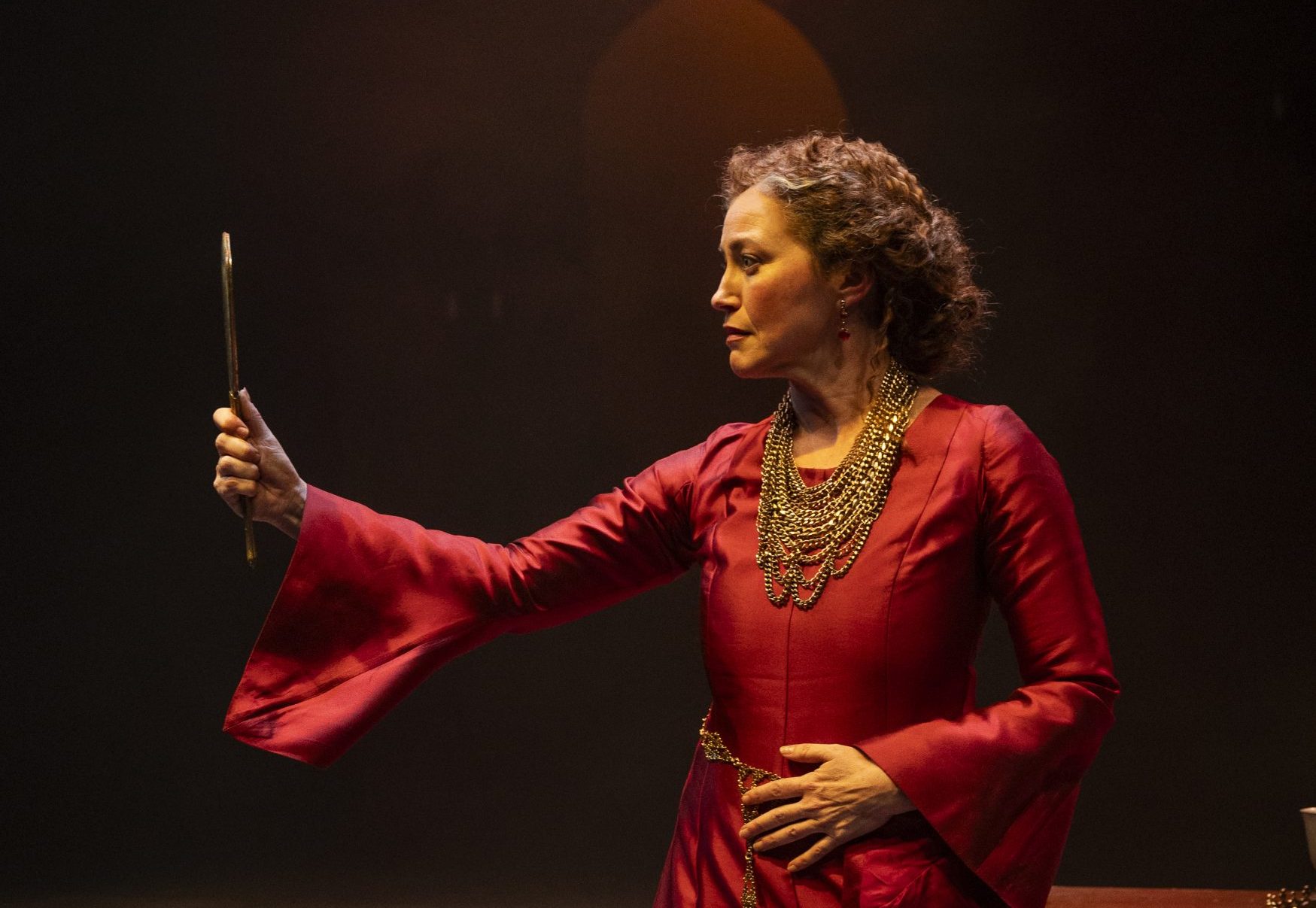by Rikki Lee Travolta
Despite having never seen it performed live on stage before, “The Lion in Winter” has long been a favorite of mine.
The tale premiered on Broadway in 1966, with a script by James Goldman. It tells the story of King Henry II of England, his estranged wife Eleanor of Aquitaine, and their sons circa 1183. Rosemary Harris won the Tony Award for her performance as Queen Eleanor and Noel Willman earned a nomination for his direction.
My first introduction to the story of a king and his legacy was watching a video of the Academy Award-winning 1968 film adaptation starring Peter O’Toole and Katherine Hepburn. The cast also featured a pre-Hannibal Anthony Hopkins and a pre-James Bond Timothy Dalton.
I was captivated by the plot and the dialogue, adapted for the screen by James Goldman himself who won an Oscar for his efforts. I immediately set out to acquire a script for the stage version, devouring it once I had it in hand. It instantly became a favorite text.
A 2003 television movie starring Patrick Stewart and Glenn Close cemented my appreciation for the piece. Goldman again did the screenplay. The Shakespearean-trained Stewart is unforgettable in his starring performance. Among the supporting cast, Jonathan Rhys Meyers absolutely floored me with his appearance as King Philip II of France (the role that Timothy Dalton previously made me fall in love with).

Court Theatre in Chicago is staging “The Lion in Winter” through December 3rd and theatre lovers are advised to make it a point to see it. The text is as magnificent as ever, direction by resident artist Ron OJ Parson is brilliant, and it features sincerely exceptional performances.
The story focuses on King Henry II, who has created a vast empire but at age 50 has begun to worry about his legacy – most importantly who will carry on his vision when he passes. His three sons – John, Richard, and Geoffrey – all wish to succeed their father on the throne. None of them are above plotting and conniving their way to becoming the heir.
Henry is a man used to getting his way. Bored of his wife, he has sentenced Queen Eleanor to life locked in a faraway tower so that he might engage in an open affair. His mistress is young Alais Capet, a princess of France who has been promised in marriage to his son Richard.
Richard is the oldest living son of Henry and Eleanor. His older brother and prior heir to the throne has recently died. Strong in body and conviction, he has a reputation as being fierce on the battlefield. As the oldest living son, Richard sees himself as the rightful heir to his father’s empire. His mother, Eleanor agrees. His father Henry, though, has other ideas.
Henry despises the idea of Richard having power. Part of this is Henry’s ego and his desire to quash anyone who might have strength to rival his own. Richard is also the favorite son of Eleanor, so out of his spite for his wife, Henry leans toward hating or at least disliking his son.

Sixteen-year-old John is Henry’s favorite son, although it is more so because of his dislike for his other two boys over any actual favor for the teenager. However, knowing he is his father’s favorite makes John a royal spoiled brat. As much as Henry may want John to be his heir, his son’s general lack of intelligence and character make it a tough sell.
Richard is Eleanor’s favorite. John is Henry’s favorite. Middle son Geoffry is nobody’s favorite, and he knows it and he resents it. He is the most intelligent in the family, surpassing not only his brothers but also his parents in logic and reason. However, like his brothers, he is conniving and longs to figure out a way to trick his way into being king.
The action of the play takes place at Christmas. Eleanor has been granted a leave from her prison to visit her estranged husband and their sons. Henry makes no effort to hide his affair with Alais from either his wife or his sons, despite Richard and John both wanting her to be theirs.
The purpose of the visit is for Henry and Eleanor to bargain as to which of their remaining sons shall be next in line for the throne. Henry also tries to strategize how to keep his relationship with Alais while at the same time planning to marry her off to whichever one of his boys he decides to name the future king. The awkwardness, uncertainty, disrespect, and dread that both Alais and Eleanor must endure is staggering.
Also a party to the events is young King Philip of France who has come to demand that Richard and Alais marry as contracted. If Henry refuses to have his mistress marry his son, Philip will demand the return of Alais’s substantial dowry. It will also seriously complicate the relationship between the two powerful countries that are both vying for dominance.

The intrigue looms large in this play. All of the characters are complex, even the more simple-minded ones. They all battle their egos and desires, they must all make the decision to swallow their pride or face brutal consequences, and they must all deal with the reality that the people they love most are the ones they can trust the least. There is no one this is truer for than prisoner-on-leave Queen Eleanor.
Henry is a man who gets what he wants. He wanted Eleanor as a wife, so he got her. When he decided he wanted to share his bed with someone else, he got rid of her. Politics require that she remain alive, but living in a highly misogynistic society, little regard has to be given to her happiness or quality of life.
Yet she still loves her husband, despite his betrayal of her and her banishment to a far-off tower. She is still intoxicated by his power and finds great pleasure in their cat-and-mouse games of one-upmanship. She knows she alone has a certain power over him. As much reason as she has to fear her husband, she also is a shrewd gambler with a few cards up her sleeve.
Rebecca Spence is breathtakingly good as Eleanor. To say her performance is highly nuanced is an understatement. She shows us all the emotions that Eleanor goes through – happy ones, angry ones, and tearful ones. As astonishing as she is in dramatic moments, Spence also has impeccable comic timing, finding all the underlying humor in the script. In the hands of a truly gifted actress, this is an award-worthy role. Spence is not only gifted, she is a gift to experience. Her performance is one of the best of the year.

King Henry II is a robust role that gives the actor entrusted with it every opportunity to show off their power. John Hoogenakker is a celebrated leading man, whose resume shows a man ideally suited to the challenges of “The Lion in Winter”. While he can make the rafters shake with his voice, Hoogenakker is at his best when he shows Henry’s softer side. He shows us a man equally capable as an intellectual or as a warrior. He too coaxes a certain level of wry humor from the text.
In fact, director Parson has done an excellent job of finding all the humorous nuances of the play, exploring different types of humor for different characters. It tempers the heavily dramatic moments well and creates an infectiously addictive package.
The interplay between Spence and Hoogenakker is theatre magic at its best – two brilliant talents sparring in the spotlight. The supporting cast is just as appealing.
Kenneth La’Ron Hamilton is fascinatingly convincing as Henry’s youngest son. His reflection of both teen innocence and a sense of royal privilege is an interesting dichotomy. Hamilton stands out in a cast filled with great performers.
Shane Kenyon is powerful as eldest son Richard. He makes strong character decisions including his body language and it translates into a rock of a performance. He is fierce in appearance and delivery.
Brandon Miller provides a bubbling cauldron of resentment as the forgotten son Geoffrey. Everyone is quick to count him out, which only fuels his desire to be acknowledged. He is appropriately sinister without being inherently evil. He has been driven to plot against others because nobody else has ever shown interest in his potential.

Netta Walker is a striking beauty, so it is clear why King Henry and his sons would all desire her Alais. However, she shows a character far deeper than outer beauty. Her Alais is tortured. She loves a man she can never be truly happy with because he will never be fully hers. At the same time, she is promised to a man she has no love for. On top of all of it, the Queen who she has betrayed is also the one she can most identify with.
Alais’ brother, teenage King Philip, is meant to have an attitude of superiority mixed with the inexperience of youth. His physical beauty is to be that which would set hearts a flutter. Like all of the other characters, he is driven by a burning sense of ambition. Anthony Baldasare puts an added focus on his manipulative nature and an overall flippant nature.
In addition to the acting being excellent, Court Theatre’s “The Lion in Winter” is also technically sound. The team packs a lot into the Court Theatre space.
Scenic design is well executed by Linda Buchanan, offering us a 12th-century castle. It is ominous and impersonal – as any sign of overt wealth tends to be. Costume design by Christine Pascual is also very impressive.
Sound design is by Christopher Kriz who has also composed beautiful transitional music. Lighting design is by Jared Gooding.
Aiding the director, Martine Kei Green-Rogers serves as production dramaturg, while casting is by Becca McCracken and associate Celeste M. Cooper. The production stage manager is Jaclynn Joslin and the assistant stage manager is Katrina Hermann.
“The Lion in Winter” at Court Theatre is a wonderful interpretation of one of the best-written dramas in rotation. It is a show that is not overdone, and thus can be quite impressive when put on stage by a talented director like Ron OJ Parson with an exceptional cast and the backstage talents of one of Chicago’s most respected theatrical institutions to bring his vision to life.
Court Theatre is the Tony Award-winning classic theatre of the University of Chicago. Performances are Wednesday through Sunday at 7:30 PM, with 2 PM matinees on Saturdays and Sundays. The theatre is located at 5535 S. Ellis Avenue in Chicago on the University of Chicago campus.
For ticket information visit www.CourtTheatre.org or call the box office at (773) 753-4472. Student, group, and military discounts are available.
Photo credit Michael Brosilow
For more reviews visit: Theatre in Chicago – your source for What’s on Stage in the Chicago Area





